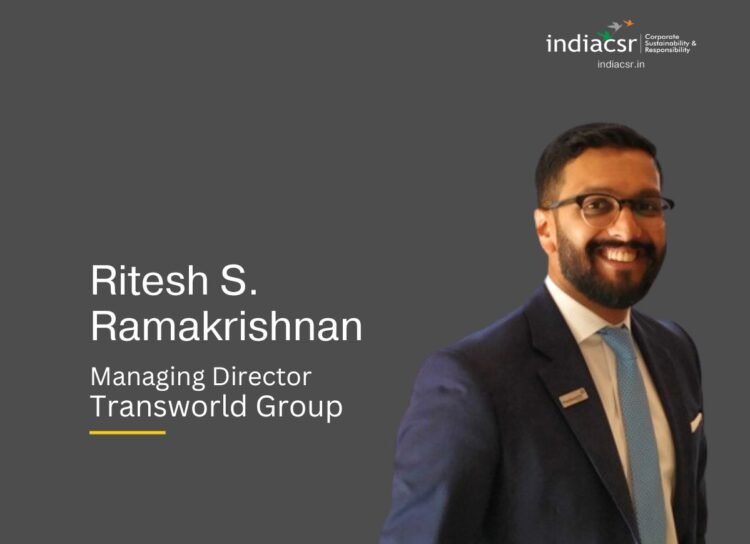
The world is rapidly evolving, interconnecting nations and communities like never before. However, as the world becomes smaller, the ripple effects of disruptions, whether they be environmental, social, or geopolitical, are felt far and wide. Today, we find ourselves confronted with challenges such as climate change, international conflicts, and social inequalities that demand immediate action. In this ever-changing landscape, the need for businesses to embed sustainability in thought and action through Environmental, Social, and Governance (ESG) commitments has never been more critical.
The shipping and logistics industry is expected to grow rapidly. In India, the sector is projected to reach USD 406.23 billion by 2029, growing at a CAGR of 6.46% from USD 297.04 billion in 2023. With this growth comes the responsibility to not only fuel economic prosperity but also drive transformative change. As the industry continues to grow and impact an increasing number of people, Diversity, Equity and Inclusion (DEI) has a vital consideration in order to foster culture of inclusion, empower communities, and ensure a resilient future.
Today, the participation of women in the logistics sector has risen to over 20%. As the number of women in our workplaces rises, our responsibility to foster an inclusive work culture becomes increasingly urgent. However, we are still a long way from seeing women adequately represented in leadership roles. Programs that support and empower women in the sector are vital to help bridge this gap.
Inclusivity, however, does not stop with women empowerment; it extends to all – including the LGBTQIA+ community. Leaders of the industry must come together and realize interventions to help support emancipation and economic independence of marginalized individuals that inhabit the same communities that we do. After all, DEI is not just about meeting targets or quotas, but about creating an environment where everyone feels valued and empowered to contribute and grow.
Here are some steps we can employ to create a culture of DEI:
1. Formulating a Robust DEI Policy
Creating a DEI culture starts with establishing a comprehensive and well-structured DEI policy. This policy should embody our commitment to fostering an inclusive workplace, ensuring equal opportunities for all employees, and embracing diversity in all its forms. We also need to encourage diversity in leadership positions, promoting a more representative and balanced decision-making process.
2. Sensitizing Employees
As the logistics industry experiences growth and becomes more diverse, equipping employees with the necessary skills and knowledge to thrive in this evolving environment becomes imperative. Offering training programs that address unconscious bias, cultural competence, and inclusive leadership is essential. Through such training, employees can develop a deeper understanding of their own biases and learn how to create an inclusive and welcoming atmosphere for colleagues from diverse backgrounds.
3. Realize Initiatives
As responsible corporate citizens, shipping and logistics organizations have a vital role to play in advancing social causes. There is an urgent need for diversity employment within the shipping industry, where only 26% of C-suite roles are filled by women. Only 31% of frontline logistics positions are held by women.
Companies like AP Moller – Maersk and Transworld Group are leading from the front when it comes to setting an example. The former committed to increasing the female ratio to 50% by 2027, from a baseline of 7.6% in 2021 . At Transworld Group, we have set up a goal for achieving a 50:50 gender ratio by 2030 as well as 40% of women taking leadership roles.
Companies that prioritize sustainability, social responsibility, and inclusion are more likely to attract top talent, build strong customer loyalty, and create supply chains that can adapt to a rapidly changing world.
4. Activate Employees
Empower your employees to actively participate in DEI and ESG initiatives. Instilling pride in company initiatives is key to transforming them into brand champions for positive change. Engaged employees become ambassadors for our vision of a more sustainable and inclusive world. By fostering a sense of purpose and connection, we create a workforce that is not just motivated by profit but driven by a desire to make a meaningful impact. This can have far-reaching effects, as the ripple of positive change starts from within and extends outward to the communities we serve.
While many leading brands in the sector have already embraced ESG principles and undertaken meaningful CSR initiatives, there is still much work to be done. As CEOs and industry leaders, we must collaborate by sharing best practices. Let us create a lasting legacy of positive change that looks beyond profits and helps elevate humanity.
Together, we have to build a better future. There really is no other option left.
About the Author
Ritesh S. Ramakrishnan, Managing Director at Transworld Group of Companies
Copyright@ India CSR







